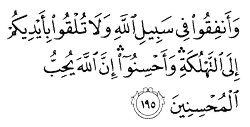Living The Quran
From Issue: 929 [Read full issue]
Lavishness
Al-Baqarah (The Cow) - Chapter 2: Verse 195
 "Expend your wealth in God's way, but cast not yourselvs by your own hands into perdition. Try to do good, for God loves the good-doers."
"Expend your wealth in God's way, but cast not yourselvs by your own hands into perdition. Try to do good, for God loves the good-doers."
In order that generosity may become a genuine Islamic virtue, it must first of all be deprived of the thoughtlessness which characterized it in the days of Jahiliyah. One who goes to the length of slaughtering on the spur of the moment, or worse still merely for display, all his camels without stopping a moment to think that his act may reduce him and his family to misery and perdition on the morrow - such a one is not to be considered a man of true generosity. A man of true generosity is he who 'expends his wealth in God's way', that is, from a pious motive. And being founded on piety, it must be something well-controlled and restrained. Generosity in Islam is something essentially different from the boastful and excessive charity of which the pagan Arabs were so fond. Thus the duty of almsgiving was offered to the Muslims as the most suitable mold into which they might pour their natural generosity without being led into the satanic vices of haughtiness and extravagance. Almsgiving provide in this way a new outlet for the old instinct of generosity that was deeply rooted in the Arab soul, but it was so calculated, at the same time, as to work as a powerful regulator of its excessive energy.
Almsgiving is a religious duty imposed on every Muslim, but to give out all one has too liberally and thoughtlessly until one is cast by one's own hands into perdition is neither more nor less than to fall back into the godless folly of Jahiliyah.
Niggardliness is of course dishonourable, it is admittedly a moral defect or a vice. But the excess of lavishness is no less a dishonourable moral defect. Keep always to the happy medium; this is the rule of conduct that must control believers in matters concerning private property.
Compiled From:
"Ethico Religious Concepts in the Quran" - Toshihiko Izutsu, pp. 78-80